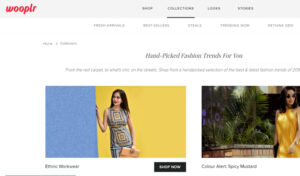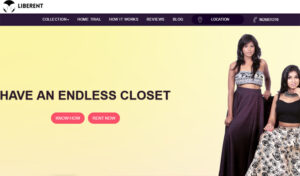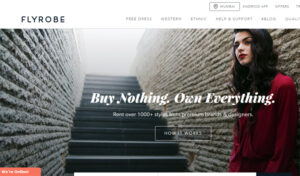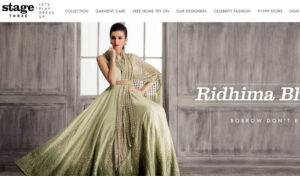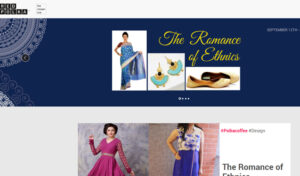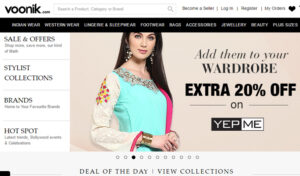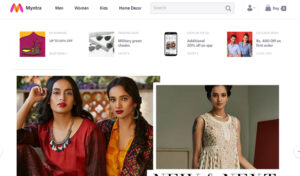The fashion retail sector is one of the most dynamic industries in India. The sector has seen many changes in recent years. From retail stores to Omnichannel strategies, to e-commerce only companies, aggregator websites and curation apps, reverse Omnichannel and now m-commerce, India’s fashion industry has come a long way.
All these developments have proven to be empowering for the consumers who now have endless garment choices, accessibility to bigger brands and more options for shopping through the digital world. But, at the same time, for the fashion retailers and e-tailers, the ever growing shopping options is leading to more competition and struggle for survival has become tougher than ever which is quite evident from the fact that there are so many mergers and acquisitions announcement grabbing news headlines on a regular basis.
Despite the competitions and other challenges, there are a number of start-ups apps on fashion that has been able to draw and hold consumers’ attention and are making their presence felt in the industry. The primary focus of these start-up apps is to make shopping a hassle free convenient experience for consumers with improved and innovative user experience and interaction.
To stay relevant and ahead of others in the market many start-up fashion e-tailers are introducing unique apps to gain and retain more and more customers. These apps are the ones that have gone beyond the selling clothes to earn a loyal consumer base:
1SOCIAL SHOPPING APPS
A number of shopping apps are making shopping a social experience by allowing customers to engage in social interaction over fashion to make better purchasing choices. Social media has proven to be an effective tool for fashion apps to engage people to shop more through decision assurance from friends and trend setters. Different apps have their own social engagement tools and methods.
Limeroad
Limeroad – a fashion discovery e-tailing website – curates more than 2,00,000 users and vendor-generated products and looks every month.
The site offers a ‘scrapbook’ option for users wherein they can create different looks from different products available on this app. Users can share these looks with others who can like and share the look on social media platforms. This also helps the vendors to understand the consumers and their choices.
About the usefulness of this scrapbook for the vendors, CEO and Founder of Limeroad, Suchi Mukherjee, said, “We make sure that the vendors are able to establish beautiful stores of their own without having to rely on excessive retail costs, while at the same time having access to an army of scrapbookers who are essentially helping them make their products look gorgeous and thereby reach out to millions of potential buyers. It’s an entirely symbiotic association between the vendor and the consumer,”
Mukherjee is an Msc degree holder from London School of Economics and was adjudged No 1 among 15 women worldwide for the title of ‘Rising Talents, High Potential Leaders Under 40’.
2Wooplr
This fashion discovery app has recently entered into social shopping space and allows users to enjoy a highly personalised shopping experience.
The team curates personalized feeds for users – curated fashion products especially for the user, according to his taste and needs.
Launched in 2013, Wooplr is co-founded by four former employees of McAfee, is operating in more than 100 cities currently and has 3 million active users.
Wooplr uses three tools to generate recommendation for its users to make the correct choice while buying fashion.
Recently in a press statement, Co-founder and CEO of Wooplr, Arjun Zacharia, explained these tools: “The first is ‘Social Recommendation’ – from people you follow on our application. Then, there is a ‘Taste Graph’, which is developed on the basis of data collected according to the action/purchases done in the past and lastly, we have a ‘Trend Chart’ that is created using computer data science and recommendations.”
3Roposo
In fashion social networking Roposo is a name that has been drawing a lot of attention that was also showcased on the App Store for a week last month.
Roposo uses a proprietary algorithm to match a shopper’s unique taste in fashion to the most relevant items from across all webstores. The fashion products that are recommended are not only filtered for a shopper’s taste, but also the latest trends derived from the collective social behavior of all shoppers on Roposo.
READ MORE: Roposo strengthens leadership ranks, appoints Head of Design and Sales
WHO’s WHO: Anand Jha, Saurabh Khullar
The app utilises user’s information to offer personalised products to suit their personality and taste.
Founded by three IIT alumni Mayank Bhangadia, Avinash Saxena, and Kaushal Shubhank, Roposo is a one-stop destination for fashionistas if you are into socialising over fashion, following and discovering trends, and for finding new products.
4STYLE RECYCLING APPS
Apart from buying new clothes, there are a few apps that let users sell pre-loved clothes:
ShareWardrobe
This app makes haute couture affordable for all by providing pre-owned luxury and designer garments.
Founded last year, this is a platform that lets users donate or resell pre-owned garments. However, in order to maintain its standard, the website has a strict quality check policy.
Simplifying this concept, founder, Aboli Salvi says, “There are two types of women shoppers in India today: One who has too many clothes – big brands, trendy, almost new – piling up in her wardrobe. And then there are others, who aspire to own a posh piece but can’t because of the price tag. And this is where platforms like ours come into play.”
5Etashee
Launched in November last year, Etashee is already receiving 1,00,000 page visits per month. This Delhi-based app allows users to post their own products for sale or also gives the option of concierge selling which is allowing the website to take care of posting and selling.
READ MORE: Recycled fashion – The new e-tailing novelty
Founder and CEO, Amna Abbasi, explains this new trend saying, “India is right now focused on online consumption, and e-commerce players are providing great deals to attract users. Once the consumption phase is over, many consumers would definitely like to share their goods. Eventually, sharing of goods makes complete sense and customers will realise it once they get full satisfaction,”
6Zapyle
This is a Bangalore-based start-up that only retails on the high end and luxury fashion brand products.
Zapyle was launched at the beginning of 2015 by Rashi Menda. Menda says the idea behind Zapyle was based on the one characteristic every woman has: to stock clothes, many of which are hardly worn. Menda says the concept is to clear your wardrobe so that there is space for new stuff while making your pre-loved fashion accessible to others in need.
On the rising popularity of pre-owned garments and changing mindset of customers, Founder and CEO Zapyle, Rashi Menda said in an earlier interview to Indiaretailing Bureau, “Shoppers today have no inhibitions in buying a pre-owned product. Moreover, we are giving something which is adding value to their closet. An LV bag originally priced at Rs 1,00,000 can easily be bought for Rs 25,000 or even lower. So, why not!”
7RENTAL APPS
Currently, the fashion rental market in India, including western and ethnic wear is estimated to be worth nearly US $5 billion. In India, the segment is picking up with many websites and apps giving the fashion conscious youth of the country a literal bang for their buck – designer clothes to shine on that special evening at throwaway prices … subject to return the next day of course!
LibeRent
One such website is LibeRent. The team delivers all rented dresses straight from the hygiene laundry, neatly dry cleaned and ironed.
The founder of Liberent.com, Sahyujyah Shrinivas, is a Metallurgical engineer by qualification and is an ex-operations manager in Tata Steel, Jamshedpur and Orissa by experience. He put his experience in the pay per use model and sharing economy to use, forming LibeRent.
READ MORE: Renting as a retail business model
The site has a rental period spread over three days, and requires no additional security deposit whatsoever. The team makes alterations according to the measurements you give them. What’s best is, they also allow a trial before the date of rental for an additional amount of Rs 350.
Users can find designers from Armani to Diane Von, to ASOS, DKNY, Vera Moda, AND, River Island, and Elle. Rental prices begin from as low as Rs 350 per day and can go up to Rs 2500 depending on the dress and the brand.
8Flyrobe
Flyrobe is India’s first and largest online fashion rental service. Sourcing from well-known brands, upcoming designers, and stores that design their own merchandise, Flyrobe, which is Mumbai-based, rents out bags, jewelry and apparel. Flyrobe’s motto: ‘Why buy when you can rent the most premium brands and country’s best designers at just a fraction of the MRP’.
Launched in September 2015 by IIT-Bombay grads Shreya Mishra, Pranay Surana, and Tushar Saxen, the startup claims to have transacted with 1,000 customers already, and closed 2015 with 100 customers on a single day – when it was just 15 weeks old.
The fashion app’s easy navigation and clean design helps consumers quickly locate outfits for all occasions. Rentals can be made within three hours from the time the outfit or accessory is required by the user and can be made for up to three days.
READ MORE: Flyrobe raises US$5.3 million from IDG Ventures, Sequoia Capital
The rentals for western apparels start at Rs 179, and can go up to Rs 18,999 (for a designer lehenga worth over a lakh). While you need not pay a security deposit for high-street brands, you will have to pay a 20 per cent deposit for designer ones.
Flyrobe’s featured brands include Zara, Mango, FCUK, Forever New, ASOS, Mango, Quirk Box, as well as collections from designers like Anita Dongre, Ritu Kumar, Masaba Gupta, Outhouse, Nida Mahmood, Samant Chauhan, Shehlaa Khan, and Surendri, to name a few.
The fashion rental app also offers curated collections by stylists, personal assistance from the said stylists and blogger curated clothes.
The app is currently only available in Delhi and Mumbai.
9Stage3
The Stage3 team describes itself as “a tight bunch of top fashion designers, serial entrepreneurs and merchandize gurus who are changing the way fashion is experienced in India”. The venture was founded by Sabena Puri – an alumnus of Harvard Business School and Columbia University – along with fashion designer Rina Dhaka and Sanchit Baweja, former CEO of Buttons and Threads.
The app lets you rent outfits by big shot Indian designers including Anju Modi, Payal Singhal, Ridhima Bhasin, Manish Malhotra, Rohit Gandhi & Rahul Khanna, Gauri & Nainika and Sabyasachi Mukherjee, among others, for just a fraction of their retail prices – 10 to 15 per cent.
The site moves fast and updates their outfit and accessory inventory often enough for repeat customers to find something new every time they log in. The team works simply – alter the outfit according to the consumer’s measurements, deliver it dry cleaned and steam-pressed and pick it up within eight days.
Stage3 is modelled on Rent the Runway, a US-based online service that provides designer dress and accessory rentals. In December last year, the New Delhi-based online clothes rental startup secured angel funding by divesting 16 per cent stake in its parent company to a bunch of angel investor – money which it plans to use for expansion.
10FASHION CURATION AND PERSONALISATION
A host of fashion e-tailers are focusing on personalising and curating products for their customers to make shopping online a convenient, hassle-free experience.
Red Polka
It focuses on three user-oriented aspects curation, personalisation, and socialisation to help users find the right product in less amount of time and make a better purchasing choice by socialising.
Started by a former media professional, Red Polka basically uses user behaviour and individual preferences to curate products that have more potential of gaining popularity among shoppers. In a highly cluttered marketplace, Red Polka aims to offers fashion products that have a higher number of buyers while making ensuring personalized curation.
Founder of Red Polka, Vishakha Singh, says, “Today, 30-35 per cent of our visitors are repeat audiences. We are working with 200 plus odd designer brands and a large number of those brands have seen the impact of Red Polka. Our weekly edition of curation of designs, stories of designers and content on designs and trends has helped Red Polka create a strong position in Shoppers’ minds, which is crucial for survival in the online marketplace.”
11Voonik
This is one of the fastest growing fashion e-tailers that started as a women-centric fashion app but recently, they also developed Mr Voonik, a men’s fashion app that curates and offers personalise trends to users.
Both Voonik and Mr Voonik offer personalised services that make this app one of its kind in this segment. In fact, the women-centric app of Voonik has been downloaded 8 million times and has 10 million registered users and has raised $20 million (Rs 133 crore) in its most recent funding.
READ MORE: Voonik acquires styling and personalisation app Dekkoh
With the recent launch of Mr Voonik, the company is expected to scale new heights. Co-Founder & CTO Voonik, Navaneetha Krishnan says, “We have crossed 6K daily shipments already. Our customers frequently explore the stylists’ picks and give us the proof of concept that men are as style conscious as women and Mr Voonik is the right platform to every man who wants his clothes perfect,”
12Myntra
This e-commerce giant took the personalisation and curation game to another level when they adopted Artificial Intelligent and big data analytics to lessen fashion production life cycle. By using Artie, a smart bot, Myntra gathered customer insights and created a range of trendy, fast fashion products under a separate brand, named ‘ModaRapido’. In short, they used an AI technology to use consumer data to create more appealing garments.
MUST READ: Myntra’s Jabong – Then and now
Founded by IIT graduates, Myntra is an experimental fashion e-tailer. Most recently, it introduced the ‘Try and Buy’ service to offer touch and feel experience to customers, breaking the final barrier between online and offline shopping.
WHO’S WHO: Manohar Kamath, Business Head, Fashion Brands, Myntra
Speaking about this innovative concept, Co-founder, Myntra, Ashutosh Lawania, said in an official statement, “Try and Buy is an important step towards offering consumers a hassle free online shopping experience and encouraging more offline buyers to shop online. This new concept will open up online fashion to a whole new section of buyers.”





